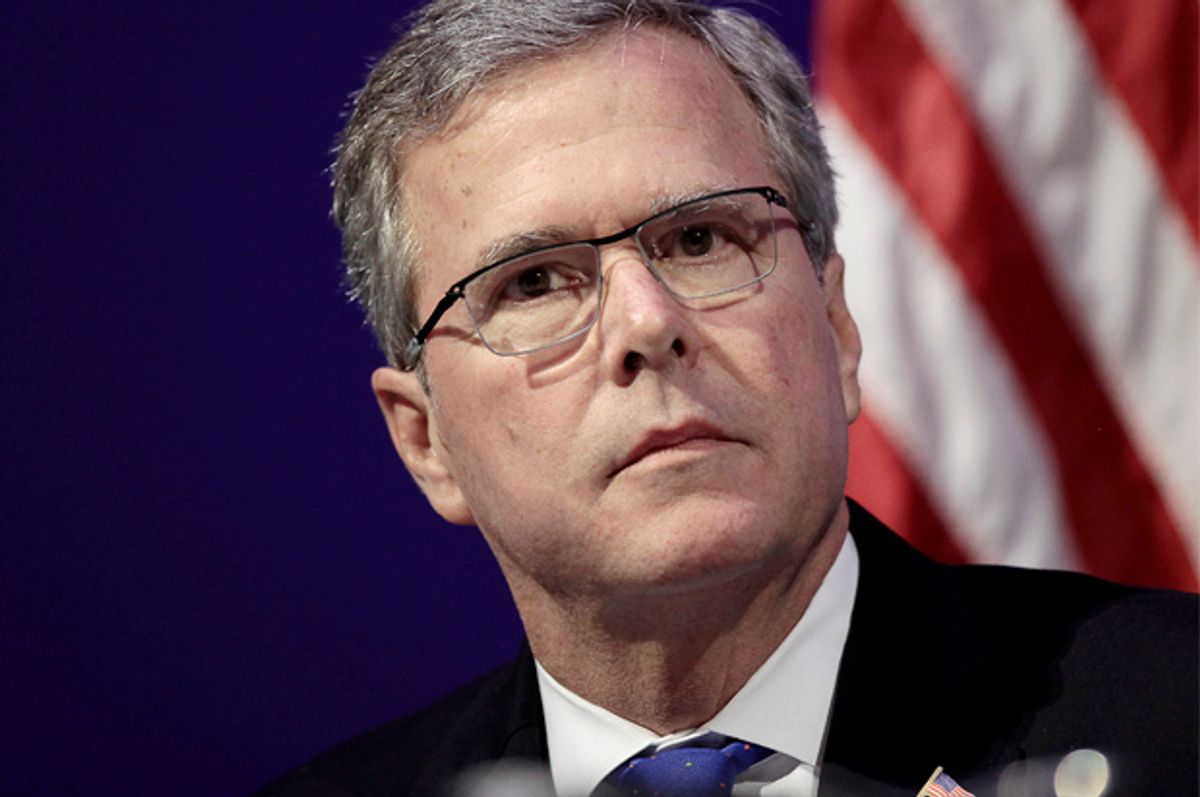There’s something quaint about the way Jeb Bush is trying to get around critiquing or endorsing his big brother’s disastrous presidency, especially when it comes to the unpopular wars President George W. Bush began and mishandled. It’s almost as if the commoners are trying to get him to gossip about family matters, and voters will understand if he’s too much of a gentleman to do so.
Asked by the Washington Post's Philip Rucker whether his foreign policy speech next week would deal with his brother's wars in Iraq and Afghanistan, Bush wouldn't answer:
"I won't talk about the past. I'll talk about the future. If I'm in the process of considering the possibility of running, it's not about re-litigating anything in the past. It's about trying to create a set of ideas and principles that will help us move forward."
Does Bush really think he’s going to get away with not talking about his brother’s wars – or his tax policies or the surplus he spent into a deficit or the economy that cratered on his watch? And how will the Florida governor square the fact that he rips President Obama regularly – in 2013 he called him a “complete and utter failure” – with his unwillingness to weigh in on the presidency that preceded Obama’s?
While Bush is talking about creating “a set of ideas and principles” for his foreign policy, I hope journalists remember that he was one of just 25 signatories to the original “statement of principles” issued by the hawkish Project for a New American Century -- alongside Dick Cheney, Donald Rumsfeld, Scooter Libby, Elliott Abrams, Norman Podhoretz, Frank Gaffney and other card-carrying neocons. He didn’t sign subsequent PNAC declarations, but as a first-term Florida governor and son of the last president, Bush’s name stood out on that founding document.
PNAC co-founder Gary Schmitt praises Bush as “a traditional Republican internationalist,” telling Politico’s Michael Crowley, “I don’t think there’s anything out of the mainstream of that part of the party.” Hawkish Bush flack Ari Fleischer agreed: “It seems as if he will come out of the more muscular peace-through-strength wing of the party,” Fleischer said.
Yet the Wall Street Journal labeled him a moderate whose foreign policy is “seen leaning toward his father’s,” not his brother’s. The cornerstone of the argument rested on Bush’s rumored choice as his top foreign policy aide: Meghan O’Sullivan, who was deputy national security adviser for Iraq and Afghanistan in his brother’s second term but is nonetheless considered a moderate. He is also close to Condoleezza Rice, who left his brother’s service with a reputation as a “moderate” who belatedly fought the neocons.
Bush hasn’t always been reluctant to defend his brother’s war legacy. “A lot of things in history change over time. I think people will respect the resolve that my brother showed, both in defending the country and the war in Iraq,” he told CNN in March 2013.
As Michael Tomasky put it in The Daily Beast, Bush’s big brother “unleashed oceans of mayhem on the world, leading to many tens of thousands of deaths; leading to the rise of ISIS, which grew directly out of the failure of our favored government in Baghdad to deal reasonably with the Sunni population; and leading, finally, to some of the most shameful moments in modern American history (torture, black sites, and the rest).” To think that he’ll be able to skirt dealing with that legacy is clueless entitlement at its finest.
The fact is, I agree that Bush shouldn’t have to answer for his brother’s mistakes – because he probably shouldn’t be running for president. He’s got the Bush name, machine and money, so his candidacy may well prevail. As we watch him get the rust out, since he hasn’t run for elective office in more than a dozen years, I predict we’ll see many more mistakes born of privilege.
Update: An earlier version of this post attributed the question about his brother's wars to Bloomberg's Michael Bender.

Shares